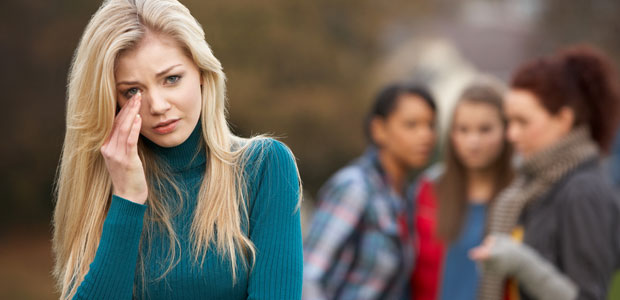Advertisement
Let’s Stand Up to Bullies – Every Day
Today is Anti-Bullying Day. As I look back on my childhood, I was lucky. I wasn’t bullied … much. But I learned how hurtful bullying can be when I had my best friend turn on me in grade 9. I never did find out what was really behind her change of heart, but she managed … Continued

Today is Anti-Bullying Day. As I look back on my childhood, I was lucky. I wasn’t bullied … much. But I learned how hurtful bullying can be when I had my best friend turn on me in grade 9. I never did find out what was really behind her change of heart, but she managed to turn the other third of what had been our trio of friends, against me.
I remember them trying to get other kids to pick on me too, but I was lucky that no one else did. I felt violated when they broke into my locker and scrawled nasty messages on my David Bowie poster.
The bullying didn’t stop at school. They’d follow me home. Although I did my best to ignore them, one bright spring afternoon, my “friend” knocked me to the ground at the top of my street. Neither one of us knew how to fight. In the 70s no one I knew carried knives to school. We grappled and pulled each other’s hair. I can’t remember anything she said to me, but I do remember asking her over and over “why?” Why was she doing this to me?
I didn’t tell my parents. But I did talk to a guidance counsellor at my high school, and Mr. Ferdas (I hope I’m spelling his name right) was my angel. When the bell rang at the end of the day, I went to his office and we’d talk – about my problems, about my plans for the future. He was the one person I remember who told me I could be anything I wanted to be – and he pulled out my school records to prove it. Mr. Ferdas even drove me home from school once or twice to help me evade my tormentors.
Unlike today’s teenagers, I was bullied in the era before computers and social media existed. My bullies grew bored with bugging me. I made a new best friend, and left my old friends behind.
Some people feel that kids shouldn’t tell anyone about being bullied, because it only makes it worse. I think they should. Bullies operate best under a code of silence – a lot of people may know about the bullying, but if they all keep it to themselves, they are aiding and abetting the bully.
A new study released a few days ago shows that kids who are exposed to bullying run an increased risk of developing psychiatric disorders as adults. And that’s whether they’re the victim or the perpetrator.
The study also revealed that kids who are both bullies and victims run the highest risk of suicide.
Whether we deal with bullies as kids, or as adults, in our homes, our schools, our playgrounds, or our workplaces, let’s break the code of silence.
Have you been bullied? Break the code of silence, and let us know how you dealt with it. Drop us a line via blog posts or Facebook comments, or on Twitter @aliveHealth.





